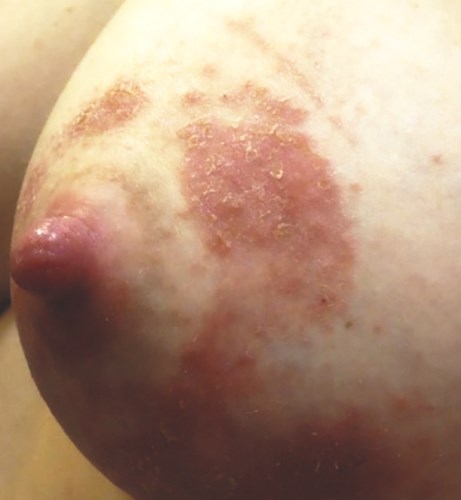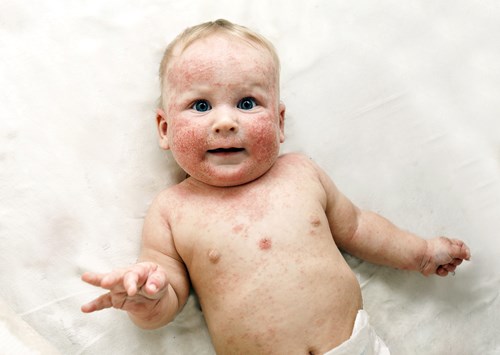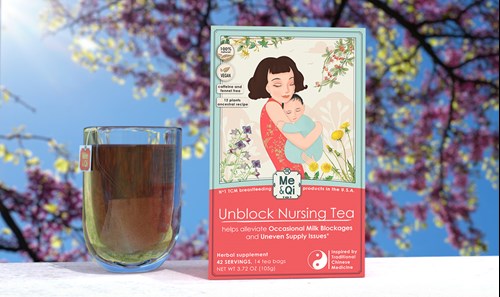Contents
- What Does Eczema On the Breast Look Like? What Are The Symptoms?
- What May Cause Eczema On Breasts, Nipples, Or Areolas While Breastfeeding?
- Can Breastfeeding Cause Other Skin Problems?
- What May Cause Eczema In Breastfed Baby?
- Is It Common To Have Breast Eczema While Breastfeeding?
- How To Nurse Baby With Breast Or Nipple Eczema?
- Can Breast Milk Treat Eczema On Mother Breasts And The Baby?
- How To Treat Breast Eczema While Breastfeeding?
What Does Eczema On the Breast Look Like? What Are The Symptoms?

Breast eczema is a skin condition that can cause rashes on the nipples, areola, or around the breasts, often with red, grey, and brown patches. The skin on the nipples or breasts may feel dry, itchy and warm to the touch. It may also peel or scab over.
During breastfeeding, the mother can experience pain and burning on the breast or nipple skin. Sometimes, hard bumps may appear with yellowish-red discharge. In addition to these symptoms, she may also notice discoloration of the nipple area with inversion or flattening of the nipple.
What May Cause Eczema On Breasts, Nipples, Or Areolas While Breastfeeding?
Breast Eczema can be caused by various reasons such as genetics, environmental factors, stress, overactivity of the immune system, or breastfeeding itself.
- Genetics
If you have a family history of eczema, you are more prone to this condition. Because you won't have the required gene to make the protein ‘Filaggrin’, which is essential to keep your skin healthy. With this genetic defect, if you get exposed to allergens such as pet hair, goods, and pollen, your skin reacts and may show eczema symptoms.
- Overactive Immune System
In some mothers, the immune system may get easily triggered by mild irritants or allergens. This overaction can cause inflammation leading to eczema.
If a mother has eczema, her baby is more likely to develop the same disease. However, it is important to know that a breastfed baby is much less likely to get eczema than a formula-fed one. Breast milk contains a large quantity of 'smart' antibodies that can fight off common allergens and reduces the risk of developing eczema in babies.
- Environment
Environment plays a big role in the development of eczema. Numerous allergens may irritate your skin, such as wool cloth, harsh soaps, air pollution, skin care products, or Tobacco smoke. In addition to these, you may also develop itchy and dry skin due to low humidity in the air.
- Emotional Stress
Stress can either cause or worsen the eczema symptoms. That is because stress increases the levels of cortisol hormone that suppress your immune system, makes your body more sensitive to common allergens and causes inflammation throughout the body.
- Breastfeeding
Eczema during breastfeeding is not an uncommon postpartum problem. At the beginning of breastfeeding, your nipples or breast skin may become dry, because of the friction caused by aggressive baby suckling due to improper latching or positioning.
This dry skin, if not properly cared for, can lead to cracks that allow the allergens to pass through the nipple skin and thus leads to eczema.
Another trigger of eczema while breastfeeding is estrogen hormone level change. Any alternation of this hormone may lead to eczema or worsens the symptoms.
Can Breastfeeding Cause Other Skin Problems?
Yes, breastfeeding can cause other skin problems, including:
- Hand dermatitis
Frequent washing while caring for a newborn may cause dryness or exposure to allergens leading to hand dermatitis.
- Melasma
Estrogen hormone level changes during breastfeeding, which can cause pigmentation of the skin, leading to melasma eventually.
- Thrush
Thrush is a fungal infection on the breast skin. It is often caused by the transmission of bacteria from the baby's mouth to the mother's breasts, resulting in red, flaky, peeling skin with pink or red nipples.
- Mastitis
Mastitis is a bacterial infection that normally occurs deeper under the breast skin. It is also caused by bacteria transmission between the mother and the baby, leading to skin inflammation associated with dry, flaky skin with sticky discharge.
- Chapped or Cracked nipple skin
Breastfeeding can also cause cracks in nipple skin due to improper latching techniques and incorrect positioning of the baby.
What May Cause Eczema In Breastfed Baby?

As mentioned above, breastfed babies are much less likely to develop eczema thanks to the various antibodies in breast milk. However, in some rare cases, they can still develop this condition, especially if they have a genetic defect.
First of all, they may have problems with the skin barrier. A disrupted skin barrier allows moisture to escape, leading to dry skin. It also allows bacteria to enter, thus causing infection.
Secondly, eczema could also occur when the body produces insufficient ceramides, the fat cells. If your baby does not have them, his/ her skin will lose water and become extremely dry.
Another possible reason for developing eczema in breastfed babies is breastfeeding itself. It delays the newborn's exposure to common allergens found in solid food and formulas. So, during weaning, when a newborn tries new food along with breast milk, their immune systems will not be able to function adequately to protect them against antigens.
Is It Common To Have Breast Eczema While Breastfeeding?
Yes, it is not uncommon to have breast eczema while breastfeeding. The most common causes are improper latching, incorrect positioning of the baby, and trapped moisture on the breasts due to tight bras.
Clogged milk ducts can be another cause. It occurs due to the thickening of breast tissue and milk ducts, causing milk to trap for prolonged periods. This accumulated milk later leads to mastitis, which may trigger breast eczema.
How To Nurse Baby With Breast Or Nipple Eczema?
Even though breast eczema causes a lot of discomfort, the mother is still encouraged to breastfeed her baby by taking the following steps. That is because breast milk provides much more benefits for babies than formula milk.
- First of all, you need to correct the bad baby latching as it is the reason for many breastfeeding skin conditions.
- Do not wear too tight bras because they can put pressure on your breasts and trap moisture that further irritates your skin.
- Use absorbent breast pads made from natural materials to soak up leaking milk. Also, do change them frequently as trapped moisture on your skin can make the itchiness worse.
- If it hurts too much to breastfeed from one side, keep direct nursing from the other side. As for the painful one, you can pump or hand-express milk and bottle feed.
Can Breast Milk Treat Eczema On Mother Breasts And The Baby?
The use of breast milk for eczema is a relatively new concept in the medical field. Only a few studies have shown that breast milk can help treat eczema symptoms in both mother and the baby.
- For the baby
A study showed that breast milk reduces eczema symptoms in infants due to its soothing properties1. In this research, the nursing mother applied breast milk to the affected areas twice daily and it was suggested that breast milk is highly effective for eczema symptoms if applied in adequate quantity and with frequency.
- For the Mothers
Researchers examined the use of breast milk for sore nipples in breastfeeding mothers2. It claims that massaging breast milk onto the nipples may alleviate discomfort or skin irritation.
How To Treat Breast Eczema While Breastfeeding?
As of now, there is no permanent cure for breast eczema, so it can last a long time and keep coming back. But there are ways to treat it and prevent its reoccurrence.
Consider these options:
- First of all, find out what seems to trigger eczema and stay away from this allergen or anything that could worsen the condition. Some of the triggers of eczema include pollen, food allergies, sweat, stress, and harsh soaps.
- Take warm showers that aren't too hot and only last for a few minutes. Make sure your affected breast area does not take too much water.
- Take a bath with diluted bleach to stop flare-ups. Add 1/4 to 1/2 cup of regular bleach, not concentrated bleach, to warm water in a standard-sized bathtub. Soak for 10 minutes with only your head out of the water, but don't do this more than three times a week. Talk to your doctor before you try a bleach bath to treat your eczema.
- After you take a shower or bath, pat your skin gently to prevent moisture to get trapped on your breasts.
- You can apply a topical lotion such as calamine to ease the itching, and burning sensation caused by eczema. It also keeps the area dry and aids in skin healing. Remember that it only works as a symptomatic treatment, as it does not cure the condition itself. Also, do remember to clean the calamine lotion before feeding as it might give a bitter taste to the breast milk.
- Apply breast milk for eczema spots as it soothes the eczema skin and prevents infection.
- Apply edible oil such as coconut oil, raw shea butter, coconut oil, and sunflower oil to soothe eczema skin.

- Try Unblock nursing tea. It contains cooling herbs such as Dandelion, Honeysuckle flowers, and Chrysanthemum flowers, which help reducing pain, soothing rash and relieving itching on the affected breast area.
- Apply 5% hydrocortisone to the irritated area. It is a low-potency steroidal medication that calms down the overactivity of the immune system to reduce pain, swelling, and inflammation. It increases natural components in the skin and reduces the appearance of rashes and flares.
- You can also use special nursing creams for eczema while breastfeeding such as “Crotamiton” and "topical benzocaine”. These may be used while breastfeeding, but the application of these creams on the nipple should be avoided.
Sources:
- Witkowska-Zimny M, Kamińska-El-Hassan E, Wróbel E. Milk Therapy: Unexpected Uses for Human Breast Milk. Nutrients. 2019 Apr 26;11(5):944. doi: 10.3390/nu11050944. PMID: 31027386; PMCID: PMC6567207.
- Amiri-Farahani, L., Sharifi-Heris, Z., & Mojab, F. (2020). The anti-inflammatory properties of the topical application of human milk in dermal and optical diseases. Evidence-Based Complementary and Alternative Medicine, 2020.

